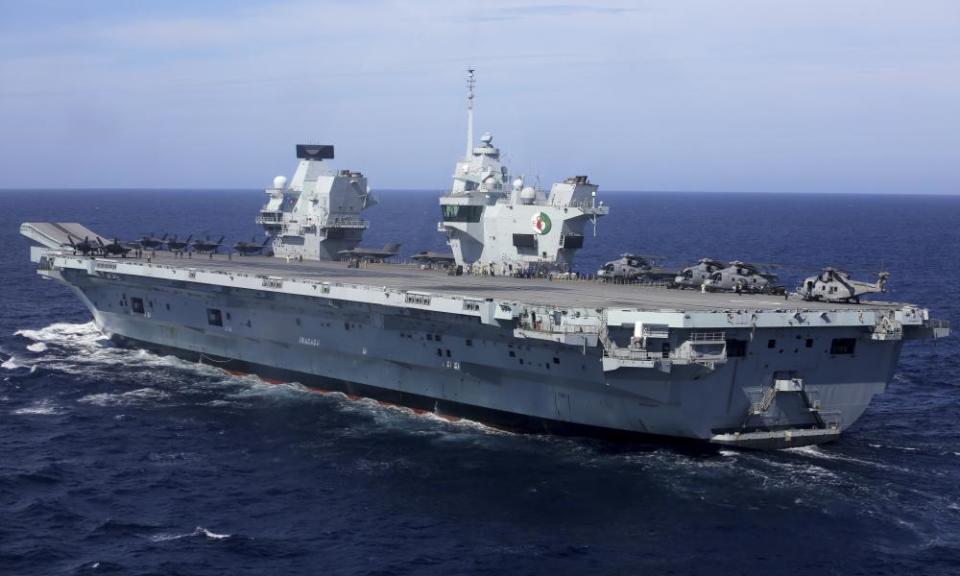UK says it has no plans for South China Sea confrontation after Beijing warning

Britain has said it has no plans to stage a naval confrontation with China in the South China Sea and that it aims to send its carrier strike group in the most direct route across the contested body of water from Singapore to the Philippine Sea.
The cooling message emerged hours after China’s military and state media warned the UK against provocation as the group, led by Royal Navy aircraft carrier Queen Elizabeth, undertakes what had been expected to be a more assertive deployment.
British defence sources said HMS Queen Elizabeth would sail “tens of miles away” from the disputed Spratly and Paracel Islands, which are claimed by China. The aircraft carrier and allied ships entered the South China Sea earlier this week and are expected to leave by the end of Saturday.
It is understood there is no intention to repeat the decision to sail the HMS Defender through disputed waters off the coast of Crimea in June, which led to the warship being followed by the Russian coastguard and being buzzed by low-flying planes.
Instead the Queen Elizabeth and its support ships will go on to take part in exercises with the US, Australia, France, Japan in the Philippine Sea, in a multinational show of strength aimed at Beijing.
One source said those exercises could include British warships visiting Japan’s Senkaku Islands, which are also claimed by China, in the East China Sea, as part of an effort by the UK to bolster its post Brexit-relationship with Tokyo.
But expectation had built up that Britain could sail closer to disputed islands in the South China Sea, which China has been accused of militarising, following the Black Sea episode and longer history of tensions between the two countries over the issue.
In August 2018, another British warship, HMS Albion, was ordered by the then defence secretary, Gavin Williamson, to sail close to the Paracel Islands, prompting a diplomatic row. Talk that the Queen Elizabeth might go to the South China Sea in 2019 led to China cancelling a round of trade talks with the UK.
Earlier, a spokesperson for China’s Ministry of National Defence, Wu Qian, said it respected freedom of navigation but firmly opposed any naval activities that aimed to provoke controversy.
“The action should never try to destabilise regional peace, including the latest military collaboration between the UK and Japan,” he said. “The Chinese navy will take any necessary actions to counter-measure such behaviour.”
The passage marks the first time Britain’s new strike group, which includes two destroyers and two frigates, has been deployed to the Asia-Pacific region.
Related: ‘They’re watching us’: Australia tracking Chinese surveillance ship heading towards Queensland
The mission has also prompted multiple reports and commentary in China’s hawkish state media tabloid, the Global Times, which said “the very idea of a British presence in the South China Sea is dangerous”.
“If London tries to establish a military presence in the region with geopolitical significance, it will only disrupt the status quo in the region … And if there is any real action against China, it is looking for a defeat.”
Later this year, the UK will also permanently assign two warships to the region. “We are not going to go to the other side of the world to be provocative. We will be confident, but not confrontational,” the defence secretary, Ben Wallace, told parliament in April.
Increased Chinese militarisation and expansionism in the region, particular towards Taiwan, which Beijing claims is a Chinese province that it will retake, have worsened tensions between China and many of its neighbours.
But even some British allies have questioned whether the UK can have an effective presence in the region. On Tuesday the US defence secretary, Lloyd Austin, warned military resources were scarce and the UK could perhaps “be more helpful in other parts of the world”.
Additional reporting by Jason Lu

 Yahoo Finance
Yahoo Finance 